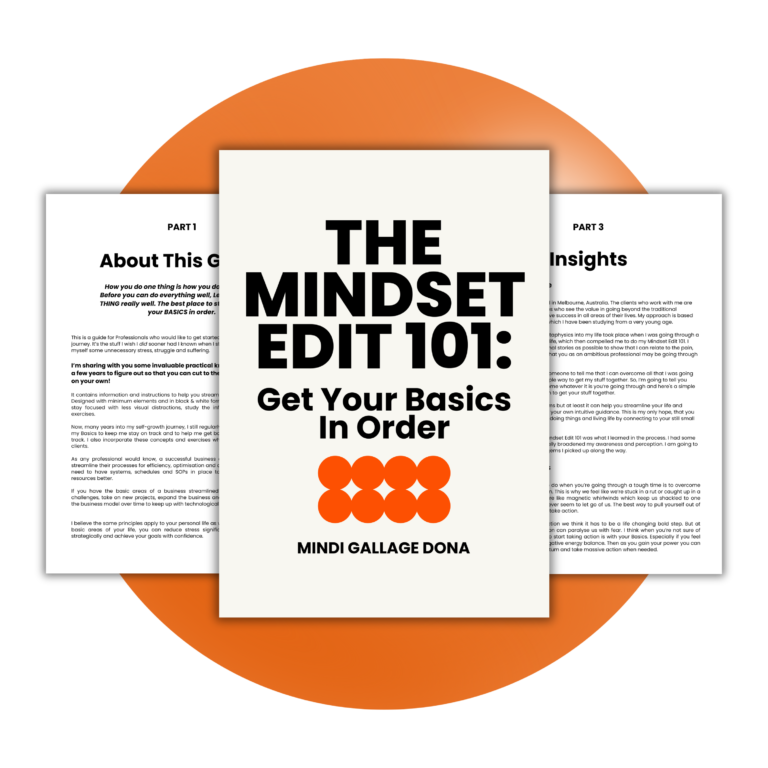Stress is one of those things in life we can’t fully eliminate. Especially when you work with a bunch of strangers in a confined space trying your best to comply with a compulsory set of man made rules to get done what you are paid to do. But, there are some ridiculously simple actions we can take to get ourselves organised and be in control of the basic and overlooked areas of our lives to minimise and manage work related stress. So when an unexpected challenge comes our way we have our basics in order, so that we can give our attention to what’s necessary and avoid as much collateral damage as possible.
Key Points:
- Why are they important
- The 5 organisational tips
- How you can implement them easily
Why Are They Important?
I have been in the workforce for almost 20 years, since high school. I have had the fortune of having very organised parents, adults, work mentors, work BFFs, work big sisters and close friends in my life who have really shaped my life. And later on when I went on to studying metaphysical literature in depth, such as Buddhism and Yoga, I noticed that they all emphasise on having a code of disciplines in your seemingly mundane life before you even think of doing advanced meditations. And these disciplines were very simple and basic tasks such as keeping your home tidy, waking up early and not brushing your teeth while relieving yourself!
I have come across many clients, managers and colleagues who are very intelligent and even the best in their field but they suffer from extreme levels of stress, anxiety and have recurring burn-outs. And when I look at their work life, they have the latest sophisticated software to manage projects and streamline tasks and even have great team members to work with. Some of them even have a good personal life with a comfortable home, resources, great family, partners and friends. So where does the work related stress come from?
You cannot compartmentalise human behaviours but a diagram can help you visualise and understand my explanation better. Think of a Venn diagram with the overlapped area of between your individual self and the work environment. This is often a neglected area by most. I’m not saying that the negligence of this area is the main reason for my observed parties to suffer from stress. However this is an important area for us to work on to manage stress in a very effective way. But this is not just to manage stress at work. How you prepare for work in your personal time affects work. And how you feel at work affects your personal life.
The organisation you own or work for has organised ways of doing things, implementing systems and having resources ready to streamline the processes and reduce risks. The very same way, you can create your unique systems and prepare resources to place you in a good position to organise your life. This way you are not wasting time and energy, constantly stressing about everything you have to do at work. You do not have to go into an extensive analysis of your life to find the perfect system. This is where starting with a few ridiculously basic organisational tips can help you reduce stress and also, help you achieve a good work life balance!
So here are 5 organisational tips to reduce stress at work, which you can implement easily.
1. Plan Your Week
I remember the first time I saw a Sunday Scaries meme on Instagram, many years ago. Seeing the likes and the comments, it turned out that I wasn’t the only one. This fear of the encroaching work week with all the doom and gloom… NO MORE!
The How
Dedicate about 30 to 60 mins to plan your week on a Saturday or a Sunday. This head start will shave off hours of misery during the week. If this is your first time planning, find a time when you feel the most alert and energised, grab your tea or coffee and even play some vibey music on.
- Look at your work calendar, personal calendar, project management tools ( Slack, Monday etc ) paper planner and other schedules of family members if relevant.
- Get an idea of the weekly overview of tasks, events & appointments you would need to attend to or where others such as family and colleagues need your help to attend to. Set reminders where necessary.
- I believe in the golden advice from the Franklin Covey system encouraging to use one calendar for both work & personal life. So that you have one source to refer to, for everything that needs to get done.
- Create sufficient buffers between commitments so you are not running from one to another. Ask help from family if you have too many school pick-ups or make a note to ask help from your colleague on Monday if you have a medical appointment.
The whole point here is you become aware of what, with whom and when you need to get things done.
What else can you plan during your weekly planning session?
2. Plan Your Travels
Even if you work from home, the chances are that you’d need to occasionally visit your work place or travel for other work commitments. Whether you have to drive, take public transport, get picked up, carpool, catch a flight, Uber or bike, get into the habit of planning your travels during your weekly planning sesh.
The How
When planning your week, look at each commitment that requires travelling, so again that you get to see the big picture.
- If your doctor is notorious for taking too long, then maybe it’s not a good idea to schedule that meeting with the very important client half an hour after your medical appointment. Tomorrow sounds much less stressful.
- Confirm the location address, times, people you have to meet, contact details etc with the events coordinator before the day of your work events.
- Check for any road work disruptions and weather conditions on the day before and the morning of. Always be prepared with your budget for petrol, parking and emergency expenses.
- I worked with someone who preferred commuting to driving because that was the only time he got to read. So maybe PT is not that bad. Try to find a way to enjoy your travel to work. This plays a significant role in learning to manage your stress levels.
Here is an interesting study worthy of reading on the relationship between commuting and stress.
3. Plan Your Meals
Once at work, I spent 40 mins browsing different menus between Uber Eats and Doordash because I was too busy to walk to the cafe next door to grab a sandwich! Then there were times I used to drink the free coffee, tea, Milo and buy Mars bars and cookies from the charity box telling myself that I’m supporting a good cause.
The How
Trying to figure out what to eat and not finding something substantial to eat can drain your energy physically, emotionally & mentally at work and after. You can even feel so anxious figuring out what to eat, not finding something to eat in a hurry and thinking of what you need to get done before the day ends.
- Even if you do not have financial concerns eating out often, plan and if necessary prep your meals for the week to spare you from that annoying decision fatigue.
- During your weekly planning, to keep you in good standing, write down go-to lists of recipes, groceries, snacks, and restaurants with your favourite options as go lists for easy reference.
- Keep the lists simple and accessible. I have all my lists on my Google Keep. This includes my family & friends’ allergies & sensitivities so I can easily pop into the shops even after work without much hassle.
- I realised planning meals and cooking are two different dragons to slay at least for me. So I prefer to plan and shop on one day and cook and prep on the next day.
Focus on nourishing your body and improving your energy levels. Start with easy recipes and healthy snack options.
4. Plan Your Outfits
Many many years ago, while I was going through a time of deep introspection and organising my wardrobe I had a satori experience. To only own clothes that I can pick-up with my eyes closed in a hurry and still feel comfortable and confident no matter where I have to go and who I bump into!
The How
I am an in-between-alist between materialism and spirituality. No matter what we say, what we wear affects our mood and performance. Have you ever had a bad day wearing your fav clothes? Even if you did it would have lessened the impact on your mood.
- As my lovely mum and an ex advised me ages ago, prepare your outfits the night before, even better during your weekly planning! Look at your commitments and plan outfits accordingly, so that you can wear the same outfit after work to your friend’s birthday drinks.
- Have at least two good outfits you can mix and match for an emergency staff photo, work function or any special event at work. For gals, also having a 5 minute hair-do and a make-up look for emergencies are a must.
- Thi might blow your mind but please get some spare underwear, socks and all other essentials undergarments. Sounds so embarrassing and commonsensical but you will be surprised at how this stresses people out especially in the morning. If you think that you have enough of these then set a reminder to do your laundry so that you don’t run out!
- Again get your basics right. Buy some basic clothing items, such as tops, bottoms, a couple of good jackets and a couple of pairs of shoes you can mix and match and can even wear to both work and personal events.
Remember, that the most important person you would need to impress is yourself.
5. Have A Note Taking System
A friend told me how his CEO asked him to come back to the meeting with a notebook and to never walk in without one in future. For him this was a life changing lesson. Note taking itself is not enough. You would need to have a – you guessed it – a simple system to take down notes as well. With many clients and colleagues I have worked with, there is a direct correlation between a good note taking system and extreme stress levels.
The How
I have seen many notebooks of others and I have tried many note taking systems since I was very young. Having a place to write down everything you need to remember can save you a lot of grief. Organised notes can lead to an organised life.
- I love stationery so I use a Filofax planner for planning & note taking related to work and workshops. You can use your tablet or iPad if you prefer digital. I use my Google Keep for taking notes at other events and add pics of presentation slides so everything is one place.
- When taking meeting notes write the date, location, people involved, concerns, outcomes and other key points. If you can’t remember something in particular, ask the hosts soon after the event and write it down! You know that the chances of you rewatching the Zoom recording to retrieve that info is very low and this can save you a lot of time.
- You can adopt a bullet journal style method with all your personal and work task lists & notes, adding symbols, labels, colour coding and creating separate folders to help you access easily.
- Get into the habit of going through your weekly notes during your weekly planning session.
The whole idea behind getting organised is not to micromanage your life so that everything goes smoothly and you live happily ever after without stress and anxiety. I always say if someone appears to be in control that means only two things, either they have really good systems in place or they are really good at pretending! So be kind to yourself. The last thing you want is feeling stressed out while trying to manage your stress at work. Give these ridiculously simple organisational tips a go!


